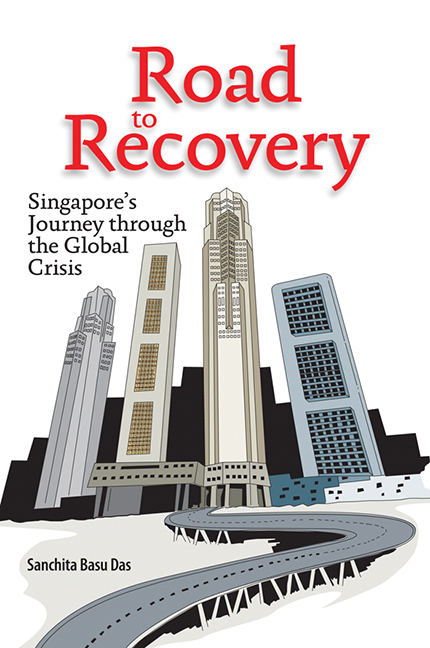Book contents
- Frontmatter
- Dedication
- Contents
- List of Tables
- List of Figures
- List of Boxes
- Foreword
- Acknowledgements
- Abbreviations
- 1 Introduction
- 2 Global Financial and Economic Crisis: Causes, Impact, and Policy Response
- 3 Impact of Global Economic Crisis on Singapore
- 4 Singapore's Policy Responses to the Global Economic Crisis
- 5 Singapore Economic Perspective and Future Policy Directions
- 6 Lessons Learnt
- Appendix I MAS Monetary Policy Statements
- Appendix II Key Budget FY2009 Initiatives
- Appendix III Summary of the ESC Key Recommendations
- Appendix IV Key Budget FY2010 Initiatives
- References
- Index
- About the Author
6 - Lessons Learnt
Published online by Cambridge University Press: 21 October 2015
- Frontmatter
- Dedication
- Contents
- List of Tables
- List of Figures
- List of Boxes
- Foreword
- Acknowledgements
- Abbreviations
- 1 Introduction
- 2 Global Financial and Economic Crisis: Causes, Impact, and Policy Response
- 3 Impact of Global Economic Crisis on Singapore
- 4 Singapore's Policy Responses to the Global Economic Crisis
- 5 Singapore Economic Perspective and Future Policy Directions
- 6 Lessons Learnt
- Appendix I MAS Monetary Policy Statements
- Appendix II Key Budget FY2009 Initiatives
- Appendix III Summary of the ESC Key Recommendations
- Appendix IV Key Budget FY2010 Initiatives
- References
- Index
- About the Author
Summary
The events of 2007–9 highlighted several lessons for the policymakers. This chapter focuses on six broad interrelated themes:
Decoupling theory a myth
Globalization adds vulnerability but also increases efficiency
Strong economic fundamentals give more room to handle the crisis
Market discipline is necessary
Stimulus packages need to be timely and carefully designed
Coordinated policy action helps in faster recovery
Decoupling Theory a Myth
Prior to the crisis, there were a lot of discussions on decoupling of emerging and developing economies from the West. In other words, it was believed that even if the advanced economies went into recession, Asia would be affected very marginally and would largely continue with its growth. However, during the economic crisis in a rapidly globalizing world, the decoupling theory has almost lost its credibility. The reduction in growth has not been limited to the advanced economies. The decline from the actual growth rate for 2007 to the growth rate estimated for 2009 is essentially identical for all four groups of countries: 6.3 percentage points for the world on average, 6.1 percentage points for the advanced economies, 6.6 percentage points for the emerging and developing economies, and 7.6 percentage points for those in the Western Hemisphere.
In the case of Singapore, which is a highly open economy, the transmission of the crisis took place through both trade and financial channels. Even though Singapore had very limited exposure to the toxic assets, the economy suffered the consequences of the recession that gripped the advanced economies of the world.
Globalization Adds Vulnerability but Also Increases Efficiency
Globalization of trade (merchandise and services), finance, and labour (demand for labour and flow of remittances) had tied countries together to a much greater extent than they had been earlier. Any crisis that affects a major country or group of countries in the global economy or financial system will have some adverse effects on all other countries.
- Type
- Chapter
- Information
- Road to RecoverySingapore's Journey through the Global Crisis, pp. 128 - 136Publisher: ISEAS–Yusof Ishak InstitutePrint publication year: 2010

